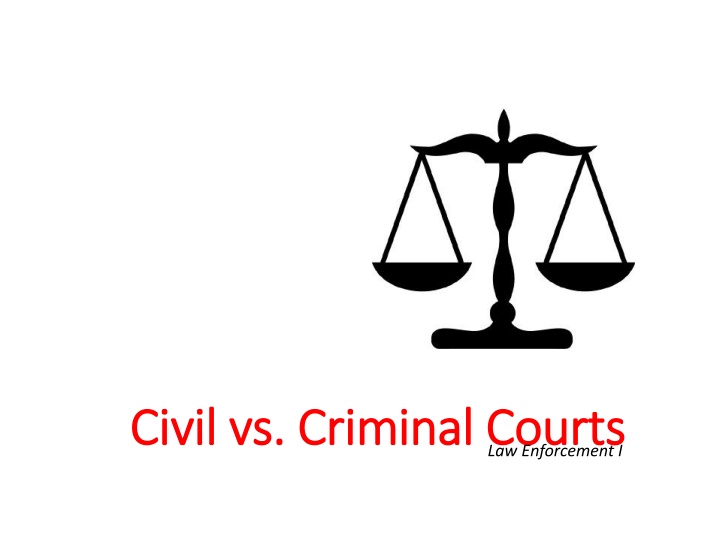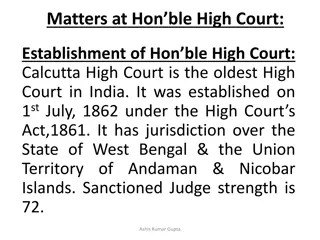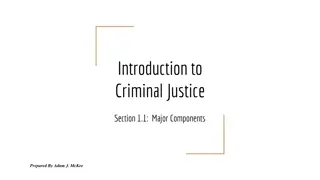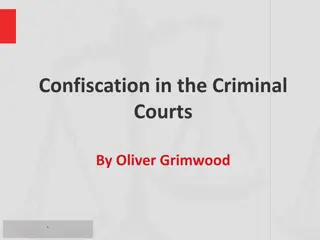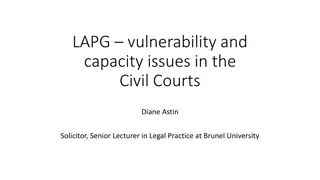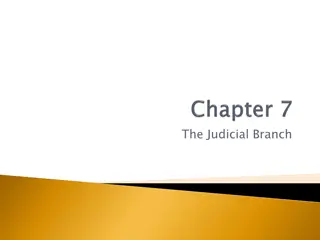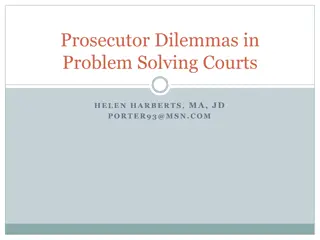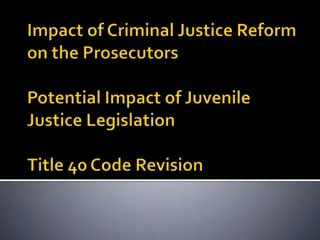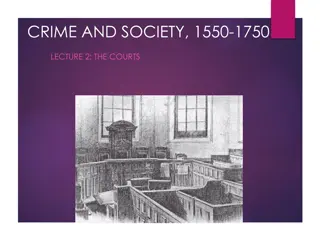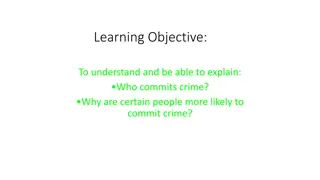Civil vs. Criminal Courts
Learn about the distinctions between civil and criminal courts, why it's crucial for law enforcement officers to differentiate between the two, and examples of civil standbys. Understand the significance of knowing the variances between civil and criminal cases, and the roles officers play in upholding order and the law.
Download Presentation

Please find below an Image/Link to download the presentation.
The content on the website is provided AS IS for your information and personal use only. It may not be sold, licensed, or shared on other websites without obtaining consent from the author.If you encounter any issues during the download, it is possible that the publisher has removed the file from their server.
You are allowed to download the files provided on this website for personal or commercial use, subject to the condition that they are used lawfully. All files are the property of their respective owners.
The content on the website is provided AS IS for your information and personal use only. It may not be sold, licensed, or shared on other websites without obtaining consent from the author.
E N D
Presentation Transcript
Civil vs. Criminal Courts Civil vs. Criminal Courts Law Enforcement I
Type of Laws There are two types of laws: Civil Criminal Constables enforce both types Most other peace officers only enforce criminal law, but often come in contact with civil law cases 2
Why is it Important to Know the Difference? Peace officers need to know the difference so they know when they can legally act on something Officers are oftentimes called out to civil cases but cannot enforce any laws 3
Why is it Important to Know the Difference? (continued) In these cases the officers are expected to maintain order and ensure no violence occurs, or make an arrest if an assault does occur These are often called civil standbys 4
Why is it Important Why is it Important to Know the Difference? to Know the Difference? (continued) (continued) Examples of civil standbys are Child custody drop off or pick up situations Landlord and tenant disputes Officers cannot enforce any court orders related to these calls but can document for future court proceedings what happened 5
Why is it Important to Know the Difference? (continued) Officers can always be called to testify as witnesses at a civil trial, just like in a criminal trial 6
What is the Difference? Civil law concerns the private rights of individuals and organizations in which the government provides a public forum for the resolution of disputes. 7
What is the Difference? (continued) Criminal law involves the violation of statutory laws in which the state (the government) is the prosecutor Some examples are arson, rape, and armed robbery 8
What is the Difference? (continued) The burden of proof in civil cases is considered to be a preponderance of the evidence which means more likely than not the person accused of the wrong did it 9
What is the Difference? (continued) The state s burden of proof in a criminal case is to prove a defendant s guilt beyond a reasonable doubt which is a much higher standard than what has to be proven in a civil case 10
What is the Difference? (continued) In a civil case, the one bringing the case is the plaintiff or petitioner and the one defending is the respondent 11
What is the Difference? (continued) In a criminal case, the prosecutor is the one who brings the charges and the defendant is the one defending 12
What is the Difference? (continued) Civil law can include private law and contract law Private law includes redress for non-criminal harm done to another Contract law regulates the varied legal transactions between groups and individuals 13
What is the Difference? (continued) Violations of statutory laws are called crimes Serious crimes are called felonies, and less serious ones are called misdemeanors 14
What is the Difference? (continued) The punishment for civil law is often monetary, which is paid to another person or institution 15
What is the Difference? (continued) The punishment for criminal law could be monetary, time spent in jail or prison, probation, community service, or all of the above, plus a report of this on a defendant s criminal record if they are found guilty 16
What is the Difference? (continued) Civil law Deals primarily with individual or property rights Involves a concept of responsibility but not guilt Usually everyone involved is a private party A dispute is usually set out in a petition The court remedy is relief from or compensation for the violation of legal rights 17
What is the Difference? (continued) Criminal law Deals with public concepts proper behavior and morality as defined by law The case is initiated by a government prosecutor on behalf of the public Specific charges of wrongdoing are spelled out in a grand jury indictment or a writ of information 18
What is the Difference? (continued) Criminal law On arraignment, the defendant enters a plea of guilty or not guilty Has strict rules of procedure that are used to evaluate evidence Determination of guilt results in punishment 19
Going to Court So, you think you were wronged and now you are going to get your $ back. Lets see how hard or easy it is
Individual Assignment Complete the filing document provided using the exercise scenario information you were provided. https://georgiamagistratecouncil.com/georgia-magistrate-court-civil- forms/# Top dumbest lawsuits: https://www.youtube.com/watch?v=3QLb38XQ5Bg
